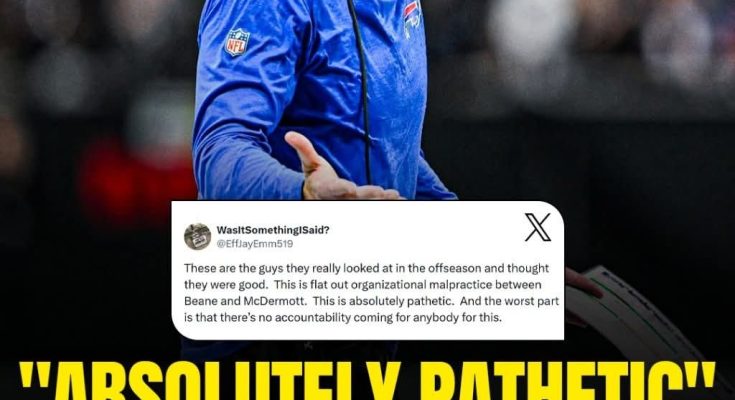The Buffalo Bills’ recent loss to the Atlanta Falcons has sent shockwaves through their fanbase, sparking intense debate about the future of head coach Sean McDermott. The disappointment is palpable, and many fans have expressed their frustration and disappointment in no uncertain terms, demanding that the organization take drastic measures, with firing McDermott being the rallying cry for a growing portion of the fanbase. To understand this reaction, it’s important to delve into the context of the loss, McDermott’s tenure, and the expectations surrounding the team.
First and foremost, the loss to the Falcons was not just any defeat; it was a devastating blow that many fans feel exposed deep flaws within the team’s strategy and leadership. The Falcons, historically not seen as a powerhouse, managed to outplay the Bills on a stage where Buffalo’s ambitions were sky-high. The Bills entered the game with high hopes—after all, this is a team that had shown promise in recent years, making deep playoff runs and establishing themselves as one of the AFC’s strongest contenders. Losing to a team that many considered underdogs made the defeat sting even more deeply.
The frustration isn’t just about this one game; it’s about what it represents. For a team led by McDermott, who has had a relatively long tenure with the Bills compared to recent NFL coaching standards, fans expected more consistency and growth. McDermott’s time with the Bills has been marked by some successes, certainly—he helped guide the team back to relevancy, fostering a competitive culture and building a strong defense. But the recent loss has made it clear to many that those successes may have plateaued, and the team under McDermott is no longer evolving in the way it should to compete at the highest level.
What’s striking is how this loss reflects on McDermott’s game management and decision-making, areas fans and analysts alike have increasingly scrutinized. Throughout the game, there were critical moments where strategic choices didn’t pan out—conservative play-calling in key situations, questionable clock management, and a seeming inability to adjust to the Falcons’ game plan. These issues aren’t new criticisms but have become more pronounced as the team’s shortcomings have surfaced in high-pressure situations. Fans see these moments as indicative of a coach who is either unwilling or unable to make the bold decisions necessary to win close, important games.
Offensively, the Bills have had glaring inconsistencies that some attribute to McDermott’s leadership style or his delegation of offensive responsibilities. While McDermott is known primarily as a defensive-minded coach, his ability to manage and inspire the offensive side has been a point of contention. The offense’s failure to capitalize on opportunities against the Falcons—struggling to find rhythm, failing to adjust when the game was on the line—has intensified calls for change. Fans wonder whether the problem lies in McDermott’s overarching strategy or his choice of coordinators and staff, and whether a new coaching regime could better harness the talent on the roster.
It’s also important to consider the psychological impact of this loss on the team and the fanbase. Buffalo fans are famously passionate and loyal, but their patience has limits, especially when the team seems to be stuck in mediocrity despite having the pieces to contend. The crushing loss has created a wave of disillusionment, shaking the faith many had in McDermott’s ability to lead the team to a championship. The narrative that the Bills are perennial underachievers in the playoffs has only been reinforced, making it harder for fans to justify continuing with the status quo.
The timing of this loss is also critical. In the current NFL landscape, where coaching changes happen frequently and often abruptly, the window for a coach to prove their worth is narrow. McDermott has had time to establish his system and culture, and the expectation is that the team should be progressing, not stagnating. When a team with high aspirations suffers a humiliating loss against a lesser opponent, it naturally leads to questions about leadership. Fans see firing the coach as a way to signal a fresh start, a reset that might inject new energy and ideas into a team that feels stuck.
However, while the demands for McDermott’s firing are loud and passionate, it’s worth considering the complexity of such a decision. Firing a head coach is never a simple matter—it involves weighing the potential disruption against the hope for improvement. McDermott’s tenure has brought stability to a franchise that struggled before his arrival, and he has a strong reputation as a defensive mastermind and a leader who builds character. There is also the factor of continuity, which many NFL teams value highly; changing coaches frequently can disrupt player development and team chemistry.
Moreover, the blame for the loss cannot rest solely on McDermott. Football is the ultimate team sport, where success depends on a combination of coaching, player performance, injuries, front office decisions, and sometimes plain luck. While McDermott’s role as head coach makes him the face of the team’s struggles, it’s also clear that issues like injuries to key players, inconsistent performances by certain positions, and front office decisions on player acquisitions have contributed to the current situation. Fans’ anger, while understandable, might be overlooking the broader picture of why the Bills lost that game.
Additionally, the reaction to this loss reflects the high expectations surrounding the Bills, which have only grown in recent years. The franchise has rebuilt itself into a legitimate contender, largely under McDermott’s guidance, and the fanbase rightly expects the team to compete at the highest level. This loss has felt like a step backward, making fans question whether McDermott can take the team the rest of the way. But it’s crucial to recognize that every team, even the most successful, experiences setbacks. The question is whether McDermott can learn from this defeat and adapt, or if he has reached the limits of his effectiveness with this group.
In the heat of the moment, the call for McDermott’s firing is a natural emotional response—fans want to see accountability and immediate action. But it’s also a moment that calls for reflection from the organization. The Bills have to decide whether to double down on the coach who brought them back to prominence or seek a new voice to lead them forward. This decision will have long-term ramifications for the franchise, its culture, and its identity.
In conclusion, the Bills’ devastating loss to the Falcons has stirred deep frustration and disappointment among fans, fueling calls for Sean McDermott’s firing. The loss symbolizes broader concerns about the team’s direction, McDermott’s strategic decisions, and the team’s inability to close out critical games. Fans’ demands for change stem from a desire to see the team fulfill its potential and finally break through to championship success. However, the decision to fire McDermott involves complexities beyond a single loss—it requires balancing stability, leadership, and accountability. Whether the Bills’ front office listens to the fans or sticks with McDermott, this moment marks a pivotal juncture for the franchise’s future. The passion of the fanbase is undeniable, and their voices are a powerful force urging the organization to make the tough choices necessary to restore Buffalo to the pinnacle of NFL success.



